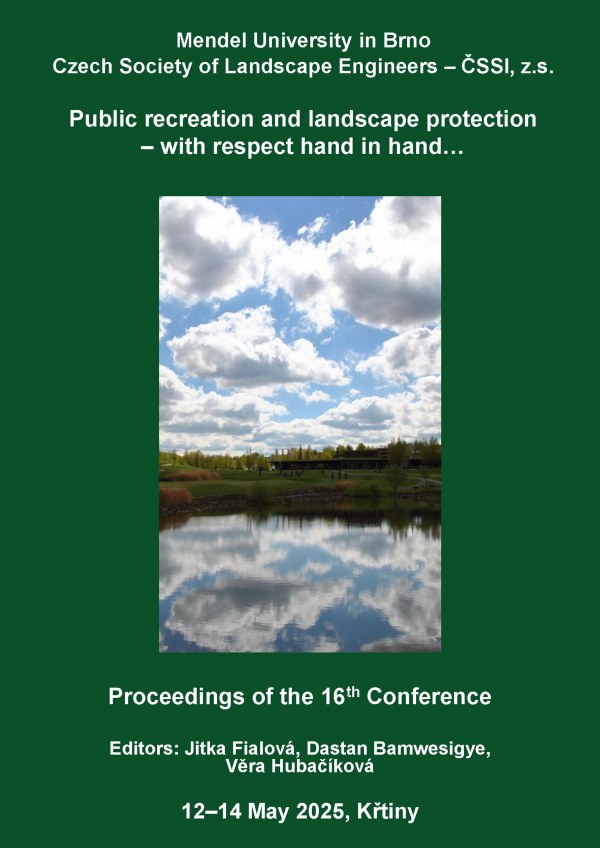
DOI: 10.11118/978-80-7701-025-2-0099
ETHNOBOTANY AS A TOOL FOR THE SUPPORT OF THE EDUCATION AND THE RECREATION OF THE ELDERLY
- Jan Winkler1, Petra Martínez Barroso2, Helena Pluháčková3, Amir Mugutdinov1, Kateřina Pevná4, Lenka Kamanová5, Magdalena Daria Vaverková2
- 1 Department of Plant Biology, Mendel University in Brno, Zemedelska 1, 613 00 Brno, Czechia
- 2 Department of Applied and Landscape Ecology, Mendel University in Brno, Zemedelska 1, 613 00 Brno, Czechia
- 3 Department of Crop Science, Breeding and Plant Medicine, Mendel University in Brno, Zemedelska 1, 613 00 Brno, Czechia
- 4 Department of Senior Education, Institut of Lifelong Learning, Mendel University in Brno, Zemedelska 5, 613 00 Brno, Czechia
- 5 Department of Social Science, Institut of Lifelong Learning, Mendel University in Brno, Zemedelska 5, 613 00 Brno, Czechia
Ethnobotany offers an opportunity to use local vegetation to promote active movement for the elderly in recreation and education. A walk through selected habitat, combined with plant identification, helps to train concentration and stimulate a human mind. Identifying plant species involves the senses of sight, touch and smell. The use of multiple senses increases sensitivity and interest in the environment while encouraging the natural need to move and discover new information. Correct identification of plant species provides valuable information that is relevant and interesting according to individual preferences of the elderly. Aesthetically attractive and medicinal plants are particularly popular with elderly. Physical exercise, knowledge of plant characters, and the use of the senses motivate memory and recall. The combination of exercise and education is an interesting and valuable recreational option for the elderly.
Klíčová slova: vegetation, cultural functions, South Moravia, medicinal plants, active aging
stránky: 99-102, Publikováno: 2025, online: 2025
Reference
- Bonnet, P., et al. (2020). How Citizen Scientists Contribute to Monitor Protected Areas Thanks to Automatic Plant Identification Tools. Ecol. Solut. Evid. 1, e12023.
 Přejít k původnímu zdroji...
Přejít k původnímu zdroji... - Cianfagna, M. et al., (2021). Biodiversity and Human Health Interlinkages in Higher Education Offerings: A First Global Overview. Frontiers in Public Health, 9, 637901. DOI=10.3389/fpubh.2021.637901
 Přejít k původnímu zdroji...
Přejít k původnímu zdroji... - Denan, N., et al., (2020). Predation of Potential Insect Pests in Oil Palm Plantations, Rubber Tree Plantations, and Fruit Orchards. Ecology and evolution. 10(2), pp. 654-661.
 Přejít k původnímu zdroji...
Přejít k původnímu zdroji... - Fagerholm, N., Torralba, M., Burgess, P.J., Plieninger, T., (2016). A Systematic Map of Ecosystem Services Assessments Around European Agroforestry. Ecol Indic. 62, pp. 47-65.
 Přejít k původnímu zdroji...
Přejít k původnímu zdroji... - Hurajová, E., et al., (2024). Biodiversity and Vegetation Succession in Vineyards, Moravia (Czech Republic). Agriculture. 14, 1036.
 Přejít k původnímu zdroji...
Přejít k původnímu zdroji... - Kopta, T. et al., (2024). The Influence of Different Methods of Under-Vine Management on The Structure of Vegetation and The Qualitative Parameters of the Grapes in the Moravian Wine Region. Folia Horticulturae. 36(2), 235-257.
 Přejít k původnímu zdroji...
Přejít k původnímu zdroji... - Lewis, S, Maslin M., (2015). Defining the Anthropocene. Nature. 519, 171-180. doi: 10.1038/nature14258
 Přejít k původnímu zdroji...
Přejít k původnímu zdroji... - Nowysz et al., (2022). Urban Agriculture as an Alternative Source of Food and Water Security in Today's Sustainable Cities. International Journal of Environmental Research and Public Health. 19(23), 15597.
 Přejít k původnímu zdroji...
Přejít k původnímu zdroji... - Pearson, D.L., Hamilton, A.L., Erwin, T.L. (2011). Recovery Plan for the Endangered Taxonomy Profession. BioScience 61, pp. 58-63.
 Přejít k původnímu zdroji...
Přejít k původnímu zdroji... - Pernat, N., et al., (2023). Citizen Science Apps in a Higher Education Botany Course: Data Quality and Learning Effects. Sustainability 15, 12984.
 Přejít k původnímu zdroji...
Přejít k původnímu zdroji... - Pfiffner, L., et al., (2019). Design, Implementation and Management of Perennial Flower Strips to Promote Functional Agrobiodiversity in Organic Apple Orchards: A Pan-European Study. Agriculture, Ecosystems & Environment. 278, pp. 61-71.
 Přejít k původnímu zdroji...
Přejít k původnímu zdroji... - Schirmer, M., et al. (2023). Educational Concepts of Digital Competence Development for Older Adults-A Scoping Review. Int. J. Environ. Res. Public Health 20, 6269.
 Přejít k původnímu zdroji...
Přejít k původnímu zdroji... - Sikkema, R., Koopmans, M., (2016). One Health Training and Research Activities in Western Europe. Infect Ecol Epidemiol. 6, 33703. doi: 10.3402/iee.v6.33703
 Přejít k původnímu zdroji...
Přejít k původnímu zdroji... - Sofo, A., Mininni, A.N., Ricciuti, P., (2020). Soil Macrofauna: A Key Factor for Increasing Soil Fertility and Promoting Sustainable Soil Use in Fruit Orchard Agrosystems. Agronomy. 10(4), p. 456.
 Přejít k původnímu zdroji...
Přejít k původnímu zdroji... - Vignozzi, N., et al., (2019). Soil Ecosystem Functions in a High-Density Olive Orchard Managed By Different Soil Conservation Practices. Applied Soil Ecology. 134, pp. 64-76.
 Přejít k původnímu zdroji...
Přejít k původnímu zdroji... - Von Hase A., Rouget M., Cowling R.M., (2010). Evaluating Private Land Conservation in the Cape Lowlands, South Africa. Conserv. Biol. 24, 1182-1189.
 Přejít k původnímu zdroji...
Přejít k původnímu zdroji... - Winkler et al., (2022). Promoting Biodiversity: Vegetation in a Model Small Park Located in the Research and Educational Centre. Journal of Ecological Engineering. 23(1), 146-157.
 Přejít k původnímu zdroji...
Přejít k původnímu zdroji... - Winkler, J., et al., (2023). Fire Hazard: Undesirable Ecosystem Function of Orchard Vegetation. Fire. 6(25) pp. 1-15.
 Přejít k původnímu zdroji...
Přejít k původnímu zdroji... - Winkler, K. J., et al., (2018). A Classification to Align Social-Ecological Land Systems Research With Policy In Europe. Land Use Policy. 79 (12), pp. 137-145.
 Přejít k původnímu zdroji...
Přejít k původnímu zdroji...


